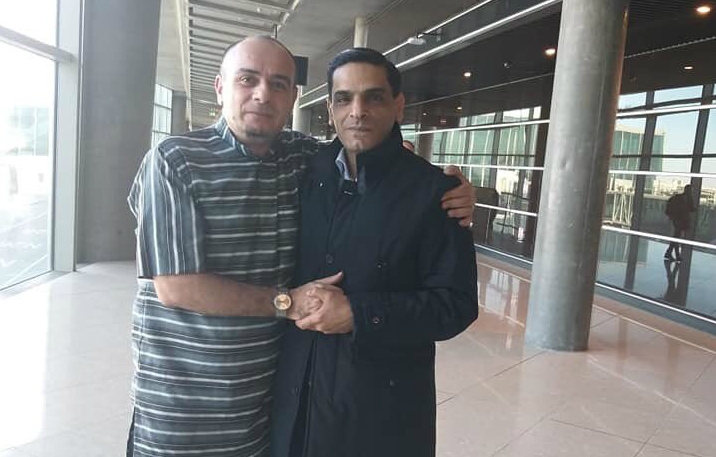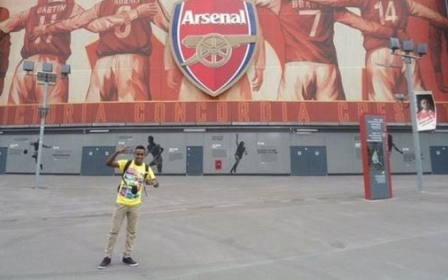Jordanian journalist arrested over Facebook post released from UAE prison

A Jordanian journalist and poet has been released from a United Arab Emirates desert prison after three years' imprisonment over a Facebook post deemed insulting to UAE "state symbols", his family told Middle East Eye.
Tayseer al-Najjar, 42, spent three years in al-Wathba, a notorious prison dubbed the "Guantánamo Bay of the UAE" in the western side of Abu Dhabi. He landed in Amman airport on Tuesday afternoon, feeling "tired and exhausted", his family said.
"He just wants to spend quiet time with his children," Majida Hourani, an artist and Tayseer's wife, told MEE.
Tayseer’s arrest and trial in Abu Dhabi in 2015 concerned a Facebook post written during Israel’s 2014 summer war on Gaza that criticised the UAE, MEE reported in May 2016.
The court ruling also cited comments Tayseer made to his wife during a telephone call that were critical of the UAE. The court did not reveal how authorities obtained records of the calls, Human Rights Watch (HRW) said.
New MEE newsletter: Jerusalem Dispatch
Sign up to get the latest insights and analysis on Israel-Palestine, alongside Turkey Unpacked and other MEE newsletters
“Message to some journalists and writers who do not like the Gazan resistance,” Tayseer wrote on Facebook.
“There is no two rights in one case, but the right one is the Gazan resistance and all else is bad - such as Israel, the UAE, [Egyptian President Abdel Fattah] el-Sisi and other regimes that are no longer ashamed of shame itself.”
An Emirati court charged Tayseer using a 2012 cybercrime law which criminalises any post online that shows an “intent to make sarcasm or damage the reputation, prestige or stature of the State or any of its institutions". If convicted, those charged can face three to 15 years of prison.
Tayseer had completed his sentence on 13 December, but the Emirati authorities kept him detained because his family had not paid a fine of 500,000 dirhams ($136,000).
'There was a library in the prison but it was limited and hard to access it'
- Majida Hourani, Tayseer's wife
"Jordan's foreign ministry and the ambassador in the UAE reached an agreement to release Tayseer without paying the fine. We are a family with a limited income, and we could not afford to pay it. We were surprised by his release," Majida said.
Tayseer, a father of five, was stopped at Abu Dhabi International Airport on 13 December 2015.
UAE authorities banned him from boarding a flight to Amman, and for two months, his whereabouts were not made known to his family.
He was denied access to a lawyer for more than a year before the UAE Federal Supreme Court sentenced him in March 2017 on charges of "insulting the state’s symbols," HRW said in December.
Weekly telephone call
Tayseer, who travelled to Abu Dhabi to work as a reporter in the cultural section of a local newspaper, was prevented from seeing his family while incarcerated.
"Only Jordanian officials in the UAE embassy were allowed to go and check on him," Majida said, adding that HRW and rights group al-Karama were also denied access.
Majida said that a weekly telephone call was the only way the family could speak with Tayseer.
"Occasionally they would allow him some books and magazines. There was a library in the prison, but it was limited and hard to access," Majida said.
Tayseer could not be reached by MEE. His family said he is still distressed by his time in prison and needs time to recover.
The UAE has come under criticism this month for detaining a British national, Ali Issa Ahmad, who has been threatened with 15 years imprisonment for wearing a Qatari national football shirt.
In May, the UAE also arrested Mathew Hedges, a British PhD student, on charges of spying for the UK government. He was given a life sentence in November, in a case that caused a diplomatic upheaval between the UK and the UAE.
Hedges, who denied the charge and says he was forced to sign a false confession, was pardoned and released later that month.
Nicholas McGeehan, a former Bahrain, Qatar and UAE researcher at HRW, told MEE that the UAE is "a police state".
"You have these squads of people who operate completely outside the rule of law and snatch people off the street, snatch people out of airports, and disappear and torture them based on spurious allegations, or based on their background, or based on their associations that the UAE disapproves of," he said.
Middle East Eye delivers independent and unrivalled coverage and analysis of the Middle East, North Africa and beyond. To learn more about republishing this content and the associated fees, please fill out this form. More about MEE can be found here.





